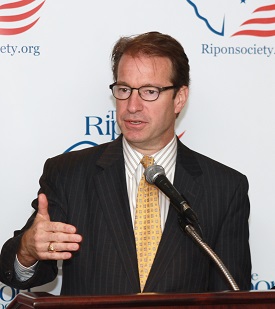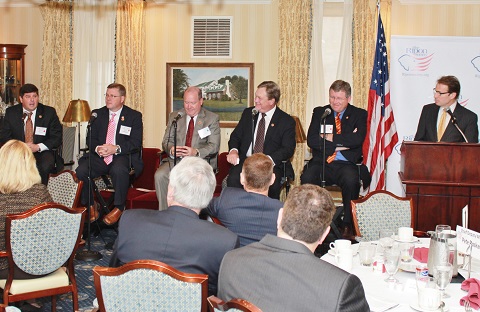Roskam leads wide-ranging discussion with Lucas, Simpson, Bucshon, Crawford
and Palazzo

WASHINGTON, D.C. – With so much attention being paid these days to political showmanship in Washington, The Ripon Society hosted a breakfast discussion this past Thursday to focus on political workhorses – that is, the Members of Congress who are focused not on grabbing headlines, but on finding solutions to the challenges facing the American people.
The discussion featured a group of Members who are doing just that, including: Reps. Steven Palazzo (MS-4), Rick Crawford (AR-1), Larry Bucshon (IN-8), Mike Simpson (ID-2), and Frank Lucas (OK-3). The discussion was led by Chief Deputy Majority Whip Peter Roskam (IL-6), who opened his remarks by talking about the House agenda and paying tribute to another workhorse who, although he wasn’t at the breakfast Thursday morning, has worked tirelessly to lay the foundation for meaningful tax reform this year.
“We had a good week,” Roskam stated, referring to the Republican Conference. “It didn’t start out as a good week, but I think it’s going to end as a good week. Our Members are coming together around a plan, and there’s a sense of clarity and purpose that we’re driving toward this fall.”
“As it relates to tax reform, I want to give a special shout-out to my colleague and chairman, Dave Camp, who has managed the process brilliantly … He laid out an agenda over the past Congress of competitiveness, and what he has successfully done is moved the debate from crazy to possible. There’s nobody in this town who says, ‘It can’t happen.’ That is basically due to one person, and that person is Dave Camp.”
Roskam then introduced another Committee Chairman and political workhorse, Frank Lucas, who discussed his efforts to ensure the country continues to have a safe and abundant source of food and fiber by passing the Farm Bill this year.
“It’s an important piece of legislation,” stated Lucas, who is a lifelong rancher and has chaired the House Agriculture Committee for the past three years. “Not only does it ensure us the production of, but it also ensures us the ability to consume the healthiest, most affordable, safest food supply in the history of the world.”
“When we go to conference with the Senate, the House will be in a position to say that in comparison to the previous Farm Bill, we want to spend $60 billion less and yet meet our obligations to provide both a safety net for the production and a safety net for the consumption of food. That’s not been without challenges. But understand this – the principle of the bill is we’re going to help everybody that needs help. But you have to play by the rules.”
Rep. Simpson, who serves as Chairman of the Appropriations Subcommittee on Interior, Environment, and Related Agencies, was introduced next by Roskam and echoed Chairman Lucas’s remarks about the need for fiscal discipline and the importance of reform.
“There’s been a disconnect between the budget resolution that passes and what it actually means in appropriations bills,” the Idaho lawmaker stated. “It’s easy to go out and be the most conservative guy in the world and say let’s cut another $100 billion out of the budget resolution without knowing what that means in individual appropriations bills. But for three years in a row and for the first time since the end of World War II, our committee has actually reduced spending.”
“There are areas in the budget that got increased, and there are areas within the budget that got eliminated – and that makes it kind of tough. But we’re finally making the connection – the Members are – between the impact of the budget resolution that we pass and what that means in actual appropriations that we’re going to have to vote for. They’re difficult budgets – but we all know the financial situation of the country. We’ve got to do it.”
In his remarks and in response to a later question asked by Roskam, Rep. Bucshon – who is serving his second term and worked as a heart surgeon prior to his election to the House – discussed how his background as a medical professional has shaped his efforts to replace the Affordable Care Act with a plan that will not only provide Americans with adequate coverage, but control rising costs, as well.
“As a physician, what I care about is access to quality medical care for our citizens,” he stated. “I think that the Obamacare approach is not going to accomplish that goal. The CBO has estimated that 30 million people will be uninsured after the health care bill is fully implemented. What’s that mean? It limits access to health care. Expansion of a failing program like Medicaid — which is not good health insurance — will further limit access. You may have a Medicaid card in your pocket, but you may find in your community that none of your physicians take Medicaid because it doesn’t pay the bills to keep the lights on in their office.
“I see Obamacare as a coverage bill that’s not going to cover everyone and does nothing to contain the costs. As the costs continue to go up in health care, the access to obtain health care is going to go down. As a physician, the bottom line for me is what’s good for my patient. The Obamacare bill is not good for our patients in this country. It is going to limit access, and I think is going to result in ultimately rationing health care based on the dollars that are available to pay for it. And as a physician, that’s just not the right approach.”

Rep. Crawford – who is also serving his second term and was the owner of an agriculture news business prior to his election in 2010 — also discussed how his career before politics shaped his work on Capitol Hill and why passing a new Farm Bill is critical not just for his state and district, but for America’s national security, as well.
“In the state of Arkansas,” the lawmaker stated in response to a question by Roskam, “we have about 250,000 jobs directly related to agriculture. My district also produces half of the rice crop in the United States. A lot of people didn’t know we produce rice in the United States. Well, we do. We’re in the top five rice exporters in the world, and half of that rice comes from my district. So I’m very sensitive to that. We also have poultry. We’re the second largest poultry producer in the nation, so it’s very, very important.”
“I’m a former farm broadcaster. I owned and operated a farm news network of over 55 stations in five states. So this is an area that I’m passionate about. But I think that where people miss the mark when we talk about the Farm Bill is the role that national security plays. We’re already energy dependent. If we become food dependent, we have really said goodbye to our national security. And that is all part and parcel of why we need a Farm Bill, why we need solid farm policy.”
Palazzo — a former Marine who serves as Chairman of the Science, Space and Technology Committee’s Subcommittee on Space – also talked about the importance of national security in his remarks, not in the context of farm policy, but in the context of America’s role in space.
“NASA has been without a destination and timeline for a while,” the Mississippian said, describing the process by which his subcommittee considered and approved a NASA reauthorization bill on July 10th. “We focused on four key priorities. One is the Space Launch System. It’s extremely important that we get American astronauts on American rockets from American soil back into space. We focused on the James Webb Telescope. We focused on the International Space Station. We also focused on commercial space, because we recognize the fact that the private sector might be able to do it a little more efficient and a little less expensive than NASA. With the reality of limited budgets and limited dollars, we would like low Earth orbit to go more commercial and have NASA focus on deep space exploration.”
“What does this have to do with national security? If you ever watched a war movie, you see these people up on a Hill with a machine gun aiming downhill. Who do you think is in a better position – the people charging up the Hill from the low ground, or the people on the high ground? … There is no higher ground than space, and America needs to be in space.”
Roskam concluded the discussion with words of praise for Lucas, Simpson, Bucshon, Crawford and Palazzo.
“The Ripon Society describes these people as workhorses,” the Chief Deputy Whip stated. “I’m telling you — I work with them and I interact with them every day, and that is an accurate description. These are Members that we need in this conference. These are Members that we need taking on this responsibility because they’re courageous, they’re willing to work with other people, they have a set of principles they’re devoted to, they’re willing to hear people out, and they’re willing to drive towards solutions to help this country. And it is an honor for me to serve with them.”
The Ripon Society is a public policy organization that was founded in 1962 and takes its name from the town where the Republican Party was born in 1854 – Ripon, Wisconsin. One of the main goals of The Ripon Society is to promote the ideas and principles that have made America great and contributed to the GOP’s success. These ideas include keeping our nation secure, keeping taxes low and having a federal government that is smaller, smarter and more accountable to the people.



